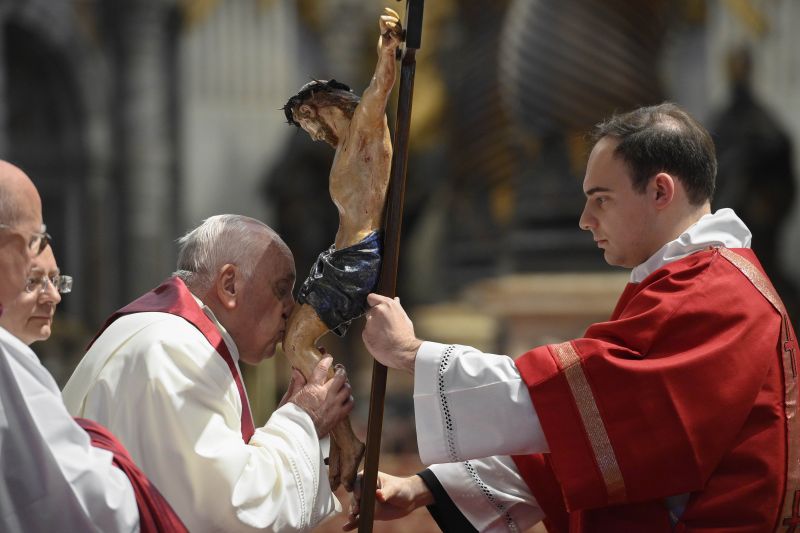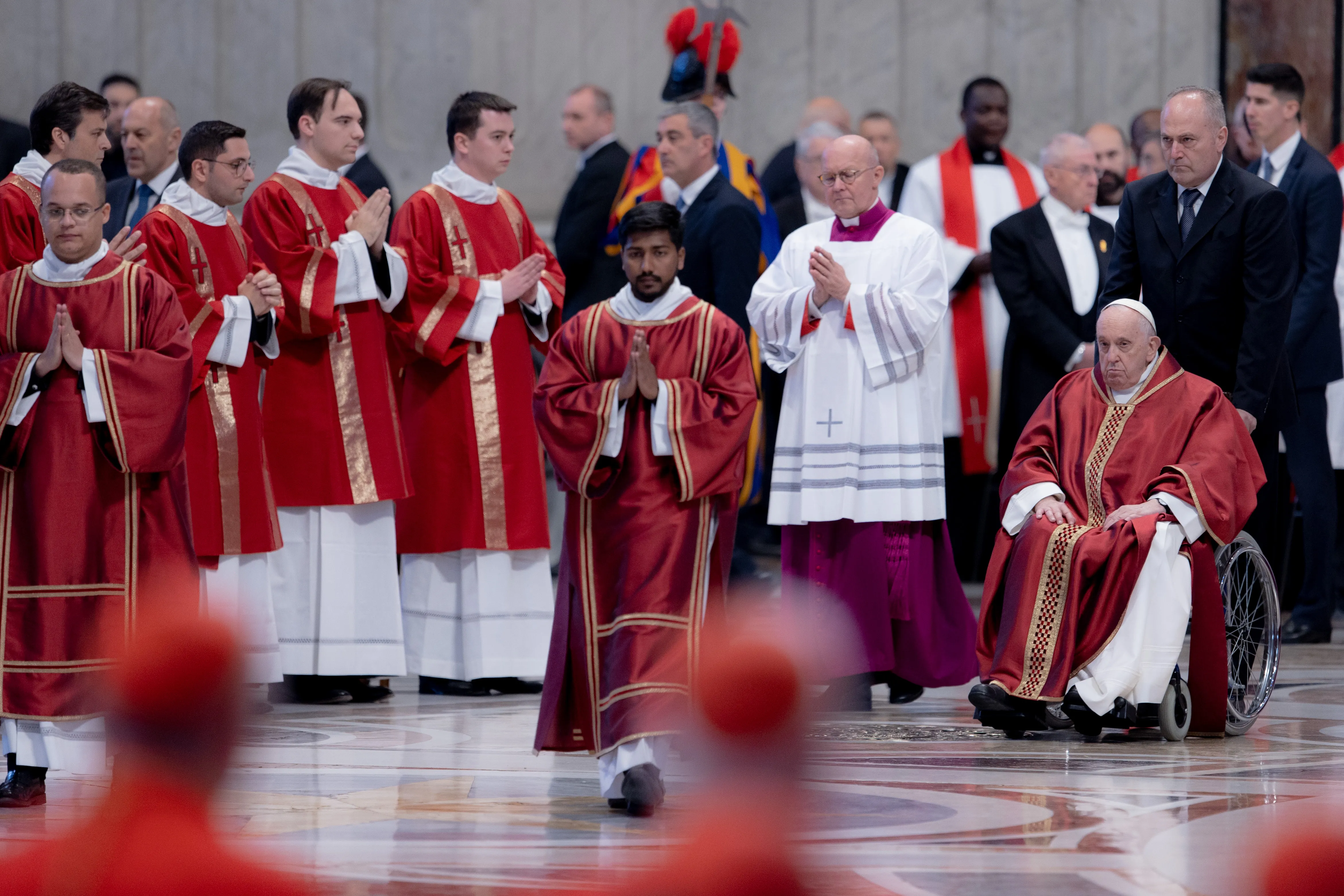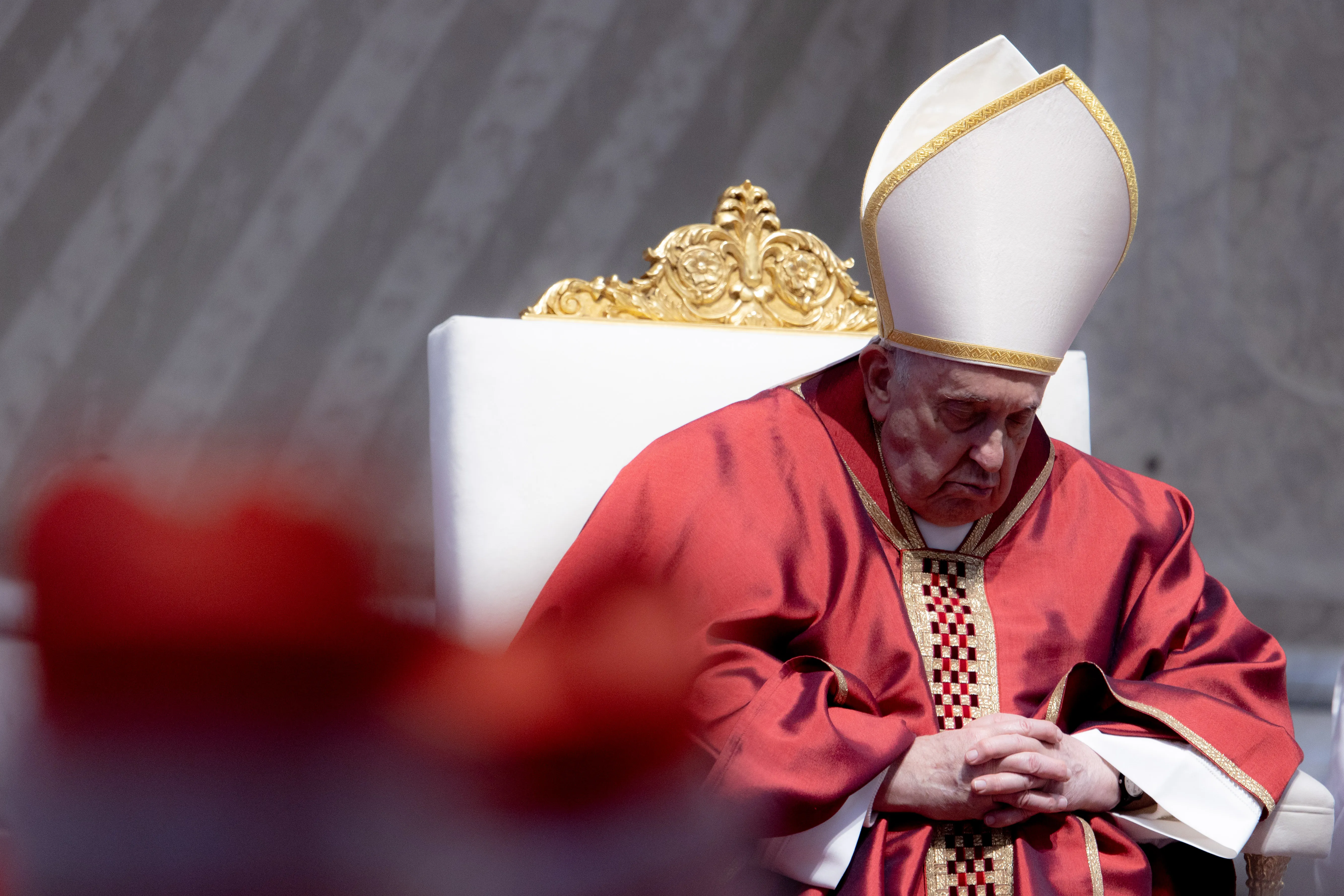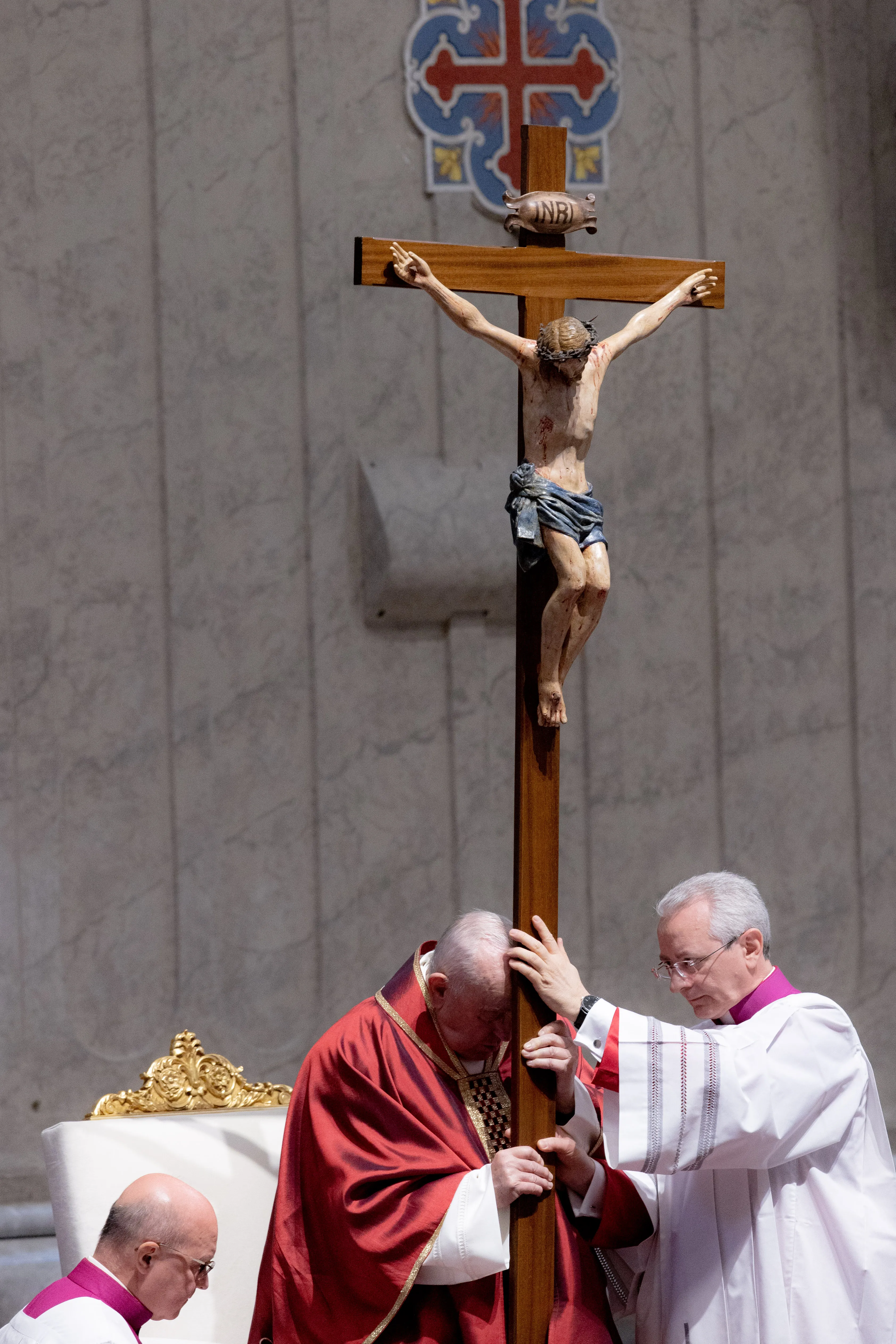
Holy Week intensifies our Lenten spiritual exercises, focusing us particularly on Christ’s Passion. From the Cross, he invites us to share in his sacrifice, so that we may in turn share in his glory.
The Seven Last Words of Christ from the Cross provide us a particularly direct invitation and can guide our meditation during these holy days.
1) “Father, forgive them, for they know not what they do” (Luke 23:34).
These words could express the entirety of Jesus’s saving action. We all have crucified him through our sins, and yet he prays for us and offers his life for our forgiveness. His life itself is salvation, a rescue mission of love in which he allows himself to be rejected by his own people in order to draw them out of slavery. Having experienced his mercy, he calls his disciples to show it to others.Loving and praying for one’s enemies proves our love and manifests God’s love to others, passing on the forgiveness we have received.
2) “Truly, I say to you, today you will be with me in Paradise” (Luke 23:43).
Jesus is not just offering forgiveness through his work of redemption; he is drawing us into a new creation, “born, not of blood nor of the will of the flesh nor of the will of man, but of God” (John 1:13). Through the gift of his life, he has created a new garden, an eternal paradise, watered from the blood flowing forth from his side. It is an everlasting “today” in God’s own eternal life. We are all in the place of the thief, and Jesus speaks to us personally from the Cross, calling us into this everlasting today with him.
3) “Woman, behold, your son! … Behold, your mother!” (John 19:26–27).
Jesus gives us everything, He offers us his own flesh and blood to eat. He sends us his own divine Spirit to dwell in us as a Temple, leading us to the Father in prayer. He also gives us his Mother as our own mother, as we are members of the Body to which she has given birth, asking us to take her into our home like John, the beloved disciple. In this act of love, he makes known to us that he holds nothing back, and his surrender of all is also a gift and invitation to us.
4) “My God, my God, why hast thou forsaken me?” (Matthew 27:46; Mark 15:34).
Jesus is abandoned by the Father in that he has followed the Father’s will in being handed over to sinners. He is abandoned to death, even as he voluntarily takes on all the sin and suffering of fallen humanity, bearing this weight and offering himself as a sacrificial victim, a paschal lamb that we might be spared from eternal death. In this moment, he has never been closer to the Father. He likewise calls his disciples to take up their own crosses and to die to themselves, joining their own suffering to his abandonment on the Cross.
5) “I thirst” (John 19:28).
In his abandonment, Jesus reveals his thirst. He told his disciples at the Last Supper that he would “not drink again of this fruit of the vine until that day when I drink it new with you in my Father’s kingdom” (Mt 26:29). He thirsts for this drink with us, this new cup of salvation that flows forth from his own side. He thirsts for us to join him in receiving his gift, to desire this gift more than anything else. This may be his strongest invitation from the Cross, calling us into the new wine he offers us in his hour that will transform us (see John 2).
6) “It is finished” (John 19:30).
In Latin, this phrase is “consummatum est,” which is rich in meaning. It refers to the debt being paid in full, the fulfillment of the Old Covenant, the completion of the sacrifice, the complete gift of self to the bride. In return, Jesus asks for the complete acceptance of this gift. He wants our whole life in return, not simply a portion of our thoughts, our affections, our time, and work. He invites us to say in return, I have given you all, the whole of my life, so we can say back to him at the end of our lives, “it is consummated.”
7) “Father, into thy hands I commit my spirit!” (Luke 23:46).
Jesus has given everything to the Father, including all of us. He will bring us to him, reconciling us to him and giving us adoption as sons in him, the Son. Everything Jesus said and did, he said was given to him by the Father. In this final word at the moment of his death, he shows us once again: everything is from and for the Father. This is the goal of his mission and his ultimate invitation for us: come to the Father with me, share in the Father’s life with me, rejoice in the Father’s love forever.
(Dr. Staudt’s column is syndicated by the Denver Catholic, the official publication of the Archdiocese of Denver.)
If you value the news and views Catholic World Report provides, please consider donating to support our efforts. Your contribution will help us continue to make CWR available to all readers worldwide for free, without a subscription. Thank you for your generosity!
Click here for more information on donating to CWR. Click here to sign up for our newsletter.











He thirsts for us to join him in receiving his gift, to desire this gift more than anything else. This may be his strongest invitation from the Cross. Calling us (Staudt).
Parishioners when asked took this literally. That in my younger days was the understanding until having read Therese of Lisieux’s autobiography. Suddenly his words began to assume hidden substance. Here, found in Therese is the God who is loved passionately, by a young woman saint who in her deep expression of love identifies that love that flows to her from God. An exchange of the most intimate love that transcends description. It is referenced by the head waiter at Cana, the best wine saved for the last.
Do we all agree that the only way Jesus can descend into hell, which hell is total abandonment by God, is for Jesus, only to be Begotten of God into the Spiritual realm, ‘Eternal Now’, upon His Resurrection as Eternal God, where Jesus now Eternally exists in the Spiritual Realm from before physical realm Creation?
Jesus’ Words, and other scriptures, all point to Christ’s Resurrection as the point where Jesus is Eternally Begotten of God. Upon Jesus’ Spiritual realm Eternal Birth to God, Jesus now exists as Eternal God in the Spiritual realm from before physical realm Creation. From the Eternal Now Spiritual realm, Jesus assists Creation into existence and comes to earth as God incarnate, as free-willed man in the womb of Mary. As God incarnate, Jesus is Fully Eternal God incapable of sins, and Fully free-willed man, capable of sin, yet never sinned. It is Jesus’ human free-willed perfect choices of obedience to God the Father, that Jesus Loves God the Father so greatly.
John 8:58
Jesus answered them: “I solemnly declare it: before Abraham came to be, I AM.”
Revelation 1:17
“Do not be afraid. I am the first and the last, the one who lives. Once I was dead, but now I am alive forever and ever.
John 17:4
“I have given you glory on earth by finishing the work you gave me to do. Do you now, Father, give me glory at your side, a glory I had with you before the world began.”
1 Peter 3:18
He was put to death insofar as fleshly existence goes, but was given life in the realm of the spirit.
Acts of the Apostles 13:32
“We ourselves announce to you the good news that what God promised our fathers he has fulfilled for us, their children, in raising up Jesus, according to what is written in the second psalm, You are my son; this day I have begotten you.”
Psalms 2:4
He who is throned in heaven laughs; the LORD derides them; Then in anger he speaks to them; he terrifies them in his wrath: “I myself have set up my king on Zion, my holy mountain. I will proclaim the decree of the LORD: The LORD said to me, ‘You are my son; this day I have begotten you. Ask of me and I will give you the nations for an inheritance and the ends of the earth for your possession. You shall rule them with an iron rod: you shall shatter them like an earthen dish.'”
Revelation 1:4 Greetings.
Jesus Christ the faithful witness, the first-born from the dead and ruler of the kings of earth.
Psalms 89:27
“He shall say of me, ‘You are my father, my God, the Rock, my savior.’ And I will make him the first-born, highest of the kings of the earth.”
Hebrews 1:5 Messianic Enthronement.
To which of the angels did God ever say, “You are my son; today I have begotten you”? Or again, “I will be his father, and he shall be my son”? And again, when he leads his first-born into the world, he says, “Let all the angels of God worship him.”
Colosians 1:15 Fullness and Reconciliation.
He is the image of the invisible God, the first born of all creatures. In him everything in heaven and on earth was created, things visible and invisible, whether thrones or dominations, principalities, or powers; all were created through him, and for him. He is before all else that is. In him everything continues in being. It is he who is head of the body, the church; he who is the beginning, the first-born of the dead, so that primacy may be his in everything.
Christ quoted two psalms from the Cross. “My God, my God, why hast Thou forsaken me?” (Psalm 21.1) You should read the entire psalm in order to understand why He quoted it from the Cross. “Into Thy hands I commend my spirit.” (Psalm 3O.6) Every Christian should know this.